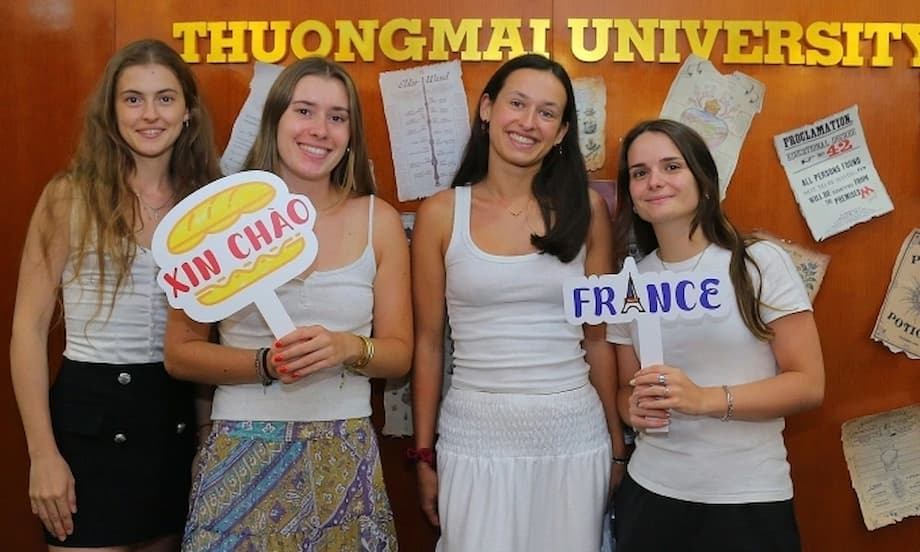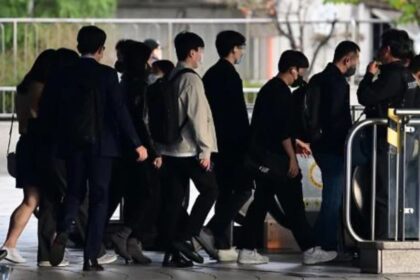A cap of 20 hours and a bid to attract talent
Vietnam is considering allowing foreign students to take paid work for up to 20 hours each week during the academic term under a draft resolution before the National Assembly. The Ministry of Education and Training says the measure is meant to help students cover living costs, gain workplace experience, and integrate with local communities. It would be the first nationwide framework that sets clear limits for international student work in Vietnam.
- A cap of 20 hours and a bid to attract talent
- Why Vietnam is moving now
- How do other destinations handle student work
- What would change if the draft passes
- Benefits for students, campuses, and the economy
- Risks, guardrails, and lessons from Japan and Korea
- Part time work within a wider education reform agenda
- What universities and employers should prepare
- Key Points
Officials frame the move as alignment with common practice in other destinations. The United Kingdom and the United States permit student work during term time with a 20 hour weekly limit, while New Zealand plans to lift its cap to 25 hours in November. Canada recently set a 24 hour weekly limit for off campus work for eligible students. Vietnamese authorities say matching that range supports fairness and reciprocity, and makes the country a more attractive study destination.
By late 2024, Vietnam had nearly 22,000 international students, the highest figure in nine years. About 80 percent came from neighboring Laos and Cambodia. Many study at Hanoi University, the University of Social Sciences and Humanities, and the Academy of Journalism and Communication. Technical and economic institutions such as Hanoi University of Science and Technology, Foreign Trade University, and Vietnam France University are also drawing more foreign students.
Why Vietnam is moving now
International student mobility is changing after the pandemic. Destination countries compete more aggressively, tuition and living costs weigh on families, and immigration rules shape student choices. Policy clarity on work rights has become a practical factor in where students apply and enroll. A legal path to part time work helps cover rent and food, and it signals that a host country understands student needs.
In Asia, governments are stepping up efforts to attract and retain international students. South Korea logged a record 204,000 student arrivals in the first half of this year and is pursuing a 300K target by 2027, with large numbers coming from China and Vietnam. Universities outside the capital are adding language programs, job fairs, and career support tailored to foreign students. Vietnam is part of this regional contest for talent, and the proposed work rule would help keep pace with competitors that already permit limited paid work during study.
The draft sits inside a broader reform push to modernize higher education and expand international partnerships. The ministry has also proposed a five year visa and work permit exemption for foreign experts and scientists with doctoral degrees who teach or conduct research in Vietnamese universities and colleges. Together, these steps aim to raise quality, build research capacity, and widen Vietnam’s connections with global academia.
How do other destinations handle student work
Rules differ by country, but the broad pattern is a weekly cap during teaching weeks, with more hours permitted during holidays. The United States allows F1 students to work on campus up to 20 hours per week while classes are in session, with options such as Curricular Practical Training and Optional Practical Training for work that is tied to the field of study. Working without authorization can jeopardize status. The United Kingdom’s Student visa typically allows up to 20 hours per week during term for degree level students, with full time work during official breaks.
New Zealand will move to a 25 hour weekly cap during term from November, part of a package designed to balance study and work. Canada, after a temporary relaxation in 2023 and early 2024, now allows eligible students to work up to 24 hours per week off campus during regular academic sessions. During scheduled breaks, such as summer holidays, many destinations permit full time work if the student remains enrolled and the break is part of the academic calendar.
Some places build in extra safeguards. Hong Kong requires a No Objection Letter tied to a student’s visa that specifies on campus work, internships, and summer jobs, along with hour limits and conditions. Institutions and employers are expected to follow those rules, and breaching them can have immigration consequences. Details are published by the Immigration Department of Hong Kong, which maintains an online guide for non local students seeking part time opportunities. Policy overview here.
The common design principle is to create a narrow channel for earning, keep academics at the center of the experience, and enforce compliance through universities and employers. Vietnam’s proposal follows that template with a 20 hour cap during term time, aligned with widely used international norms.
What would change if the draft passes
Vietnam currently has no specific hour limit or formal framework for international students who seek paid work. A 20 hour cap would, for the first time, give students, universities, and employers a clear baseline. It would also give authorities a way to define acceptable work during study and to penalize abuses.
Key implementation choices still lie ahead. Lawmakers and regulators would need to spell out whether the 20 hour limit applies only to on campus roles or also to off campus jobs, what kinds of work are allowed, and how to handle breaks and public holidays. They will also need to decide whether special rules apply to language students, pathway programs, and short courses.
Monitoring and compliance would be essential. Many countries tie student work to identification numbers used for tax and social insurance, such as the United States Social Security Number or Canada’s Social Insurance Number. Universities often play a gatekeeping role, verifying enrollment, academic standing, and hours. Hong Kong’s No Objection Letter model links immigration permission with clear written conditions for employers and students. Vietnam could draw on those practices to build a simple but firm system that protects students and maintains academic focus.
Clarity on penalties would matter as much as guidance. Employers that push students beyond legal limits or pay below lawful wages are a common risk in student labor markets. A transparent penalty schedule, easy reporting channels, and joint oversight by labor and education authorities can deter abuse without adding heavy paperwork for compliant businesses.
Benefits for students, campuses, and the economy
Allowing international students to work a limited number of hours can deliver practical gains. Students cover more of their living costs, ease financial stress on families, and build the soft skills that employers seek, such as teamwork, time management, and communication in a second language. Work experience also helps students test career interests and strengthen resumes for future applications.
Universities gain a recruiting tool and build stronger ties with local employers. Career centers can connect students with campus jobs and vetted off campus roles, improving retention and student satisfaction. Employers gain access to multilingual talent and culturally agile workers who can support customer service, tourism, technology support, and other services where language skills add value.
- Students earn income while studying and gain workplace exposure.
- Campuses can offer more assistantships, tutoring, and research support roles.
- Employers tap a flexible pool of young, educated workers during peak hours.
- Communities benefit when international students integrate through work and service.
Risks, guardrails, and lessons from Japan and Korea
Student work can go wrong without guardrails. Vietnamese student workers in Japan have reported heavy debts to recruiters, long shifts that exceed legal limits, and low wage jobs that derail studies. Advocacy groups and researchers describe an education migration industry that can pull students into precarious work with little protection. These experiences show how weak oversight, profit driven intermediaries, and vague rules can undermine the promise of studying abroad.
In South Korea, many foreign students describe underuse of skills and difficulty finding work aligned with their studies. Some report internships that turned into translation or clerical tasks rather than hands on experience in their fields. Even highly qualified graduates struggle to secure long term roles, reflecting gaps between education, immigration policy, and employer practices.
Vietnam can address these risks from the start. Clear hour limits, strong wage enforcement, and university checks on academic performance can prevent overwork. Transparent job ads, standard contracts in multiple languages, and hotlines for complaints make it easier to report problems. Publicizing penalties for non compliant employers helps deter abuse, while rewarding good actors with access to recruitment fairs and campus partnerships encourages better practices.
Part time work within a wider education reform agenda
The draft work rule is one piece of a broader set of proposals that aim to upgrade Vietnam’s education system. The Ministry of Education and Training is advancing a reform package that includes making lower secondary education mandatory by 2030 and moving toward universal upper secondary education by 2035. The plan also calls for more flexible university programs, stronger links with industry, and partnerships with leading global institutions.
To attract high level talent, the ministry proposes a five year visa and work permit exemption for foreign experts and scientists with doctorates who teach or conduct research at Vietnamese universities and colleges. Such a measure would make it easier for laboratories, research centers, and elite academic programs to recruit mentors who can train students and build research groups.
Workforce needs in strategic sectors add urgency. Vietnam is planning a major expansion of its rail network, including a North to South high speed line, and expects to train about 140,000 workers in phases through 2045. Closing skill gaps will require tighter coordination between universities, vocational schools, employers, and government agencies, plus more international cooperation for technology transfer. Making campuses friendlier to global talent, both students and experts, fits that picture.
What universities and employers should prepare
If lawmakers approve the 20 hour cap, universities would become the front line for making the policy work. Clear guidance in student handbooks, orientations on labor law, and simple approval workflows can reduce confusion. Career centers can expand vetted job boards, prioritize campus roles that build skills, and help students prepare resumes and practice interviews.
Employers should plan for compliance and support. Standard contracts that state hours and wages, payroll systems that track student hours, and manager training on hour limits reduce risk. Clear escalation paths for complaints and a commitment to anti discrimination in hiring signal that international students are welcome and safe at work.
Students will also need plain language resources. Step by step guides on how to find legal work, how to obtain tax numbers, and how to balance work with academic commitments can prevent common mistakes. Universities can partner with local labor offices and tax authorities for workshops and clinic days. Alumni and senior students can mentor newcomers and share good practices.
Key Points
- Vietnam is weighing a rule to let foreign students work up to 20 hours per week during term time.
- The plan aligns with common limits in the UK and US, while Canada allows 24 hours and New Zealand is moving to 25 hours.
- Vietnam hosted nearly 22,000 international students by late 2024, with about 80 percent from Laos and Cambodia.
- The draft also proposes five year visa and work permit exemptions for foreign experts and PhD holders in higher education.
- Implementation choices include on campus versus off campus work, holiday rules, monitoring, and penalties for violations.
- Benefits include reduced financial strain, stronger resumes for students, and better recruitment tools for universities.
- Risks seen abroad, such as exploitation and overwork, underscore the need for clear rules, wage enforcement, and easy reporting.
- The policy forms part of a wider education reform effort that aims to raise quality, expand partnerships, and meet skilled workforce needs.












